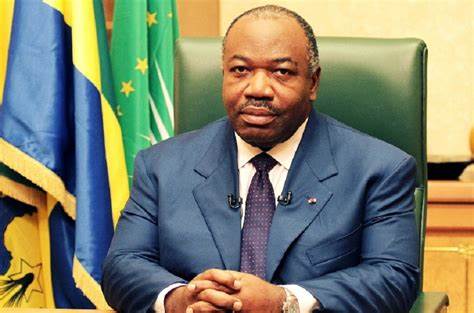By Hassan Osman Kargbo
Former Gabonese President Ali Bongo Ondimba, who was ousted in a military coup in August 2023, has left Gabon and resettled in Angola with his family, according to an official announcement from the Angolan Presidency.
A statement posted on social media by Angola’s Presidency confirmed Bongo’s arrival in Luanda, the capital, stating that he was accompanied by his family, including his wife, Sylvia Bongo, and their son Noureddin Bongo Valentin. The announcement also noted that the family had been released from detention and were now reunited.
The Bongos’ departure marks a significant development in the aftermath of the coup that ended Ali Bongo’s 14-year rule. The military seized power shortly after Bongo was declared the winner of a contested election, citing concerns over governance, corruption, and transparency.
Following the coup, Bongo was initially placed under house arrest, although he later appeared in a video released by the military asking for international support. His detention was eventually eased, with the transitional authorities stating that he was “free to move about.” However, his family members were not granted the same leniency at the time.
Sylvia Bongo and Noureddin Bongo were arrested in connection with corruption investigations launched by the junta shortly after seizing power. Noureddin, who had held influential advisory roles during his father’s Presidency, was accused of embezzlement and money laundering. His mother, Sylvia, was also accused of involvement in alleged financial mismanagement and influence-peddling.
Though neither has publicly responded to the charges, Sylvia Bongo’s legal team has vigorously denied any wrongdoing on her part. Her lawyer condemned her detention as “arbitrary and illegal,” calling for her immediate release and describing the case as politically motivated.
The Angolan Presidency did not elaborate on the legal status of the Bongo family now that they are in Luanda. It remains unclear whether any extradition agreements or international legal proceedings are in place that might affect their current standing.
Ali Bongo’s relocation to Angola could signal the end of his political chapter in Gabon, though it is too early to determine his future intentions. Angola, a regional power and member of the Economic Community of Central African States (ECCAS), has not commented on the long-term arrangements regarding Bongo’s stay.
The transition in Gabon continues under General Brice Oligui Nguema, who led the coup and has since been serving as the interim President. Nguema has pledged to hold democratic elections, although no date has yet been set. His administration has launched a series of anti-corruption investigations aimed at reclaiming state funds and restoring public trust.
Bongo, now in his mid-60s, succeeded his father, Omar Bongo, in 2009, continuing a family dynasty that had ruled Gabon for over five decades. His Presidency was marked by economic challenges, accusations of authoritarianism, and growing dissatisfaction among the population, which ultimately set the stage for his downfall.
The move to Angola brings a new dimension to the post-coup narrative, as Gabon grapples with its political future and the legacy of the Bongo era.











